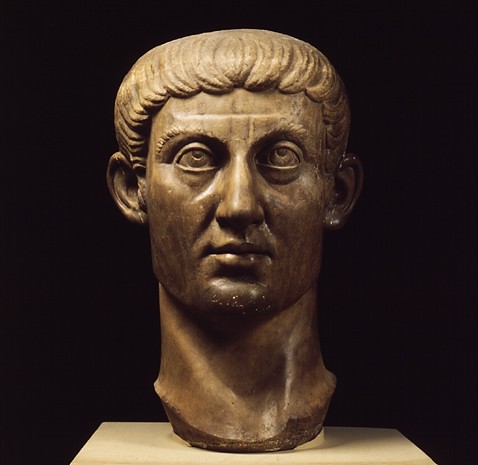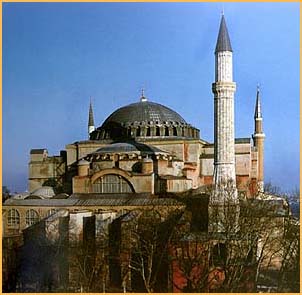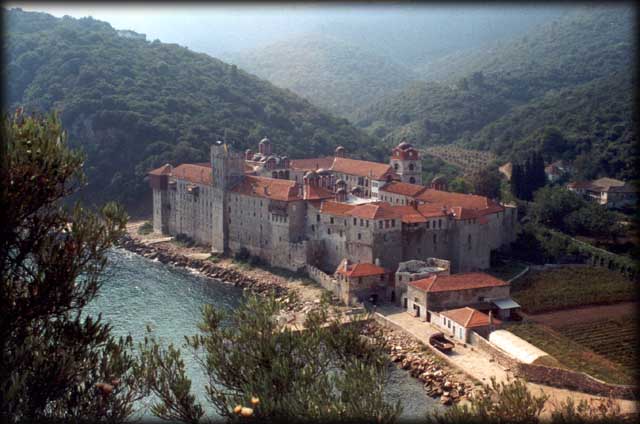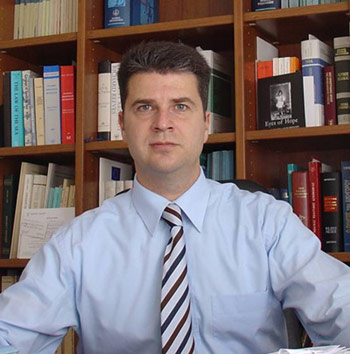 |
||
|
BYZANTIUM, A HELLENIC EMPIRE By Christos ILIOPOULOS |
||
For us, the Greeks, Byzantium means Greece.  However, the rest of the world does not always have a clear view of Byzantium and about its Greek or Hellenic identity. The average person of the world has not been exposed to information (films, books, popular presentations) regarding the Byzantine Empire, which lasted for about 12 centuries and considerably influenced the western society as we know it today. However, the rest of the world does not always have a clear view of Byzantium and about its Greek or Hellenic identity. The average person of the world has not been exposed to information (films, books, popular presentations) regarding the Byzantine Empire, which lasted for about 12 centuries and considerably influenced the western society as we know it today.Greece is: Ancient Greece, the Empire of Alexander the Great, the Byzantine Empire, the Greek Orthodox Church and the modern Greek state since 1830. In 667 B.C. King Bysas (Vysas, in Greek) from the Greek city of Megara founded a colony at the seaport of Byzantium (Vyzantio, in Greek), at the entrance of the Black Sea. The Byzantine Empire was founded when the capital of the Roman Empire was transferred from Rome to Constantinople in 324 a.d. It existed in the eastern Mediterranean area until the fifteenth century, that is until the fall of the capital city of Constantinople to the Ottoman Turks in 1453, which is considered probably the worst date in the history of Hellenes. Constantinople became known as the "New Rome". The arts and culture of this Empire created a cultural excellence. The most important personality which created Byzantium is the Roman emperor, Constantine the Great (274-337), who established toleration for Christianity throughout the Roman Empire through the Edict of Milan in 313. Constantine legally transferred his capital from Rome to Constantinople, on the site of the Greek city of Byzantium and became at the end of his life Christian. So it was that the empire continued to be ruled by Roman law and political institutions, with the elite communicating officially in Latin. Yet the population, now Christian, also spoke Greek. In school students studied the ancient Greek classics of literature, philosophy, science, medicine, art, and rhetoric. The church developed its own literature and philosophy.  One of the advantages of Constantine's new capital was that it was on an easily fortified peninsula; as it was closer to the dangerous frontiers of the empire than Rome, imperial armies could respond more rapidly to crises. The strategic location of the city enabled merchants there to grow rich through their control over the trade routes between Europe and the East and the shipping lanes connecting the Black and Mediterranean Seas. Constantine built on his new capital a university, two theaters, eight public and fifty-three private baths, four law courts, fourteen churches, and fourteen palaces. He imported staggering quantities of the best Greco-Roman art from throughout the empire. One of the advantages of Constantine's new capital was that it was on an easily fortified peninsula; as it was closer to the dangerous frontiers of the empire than Rome, imperial armies could respond more rapidly to crises. The strategic location of the city enabled merchants there to grow rich through their control over the trade routes between Europe and the East and the shipping lanes connecting the Black and Mediterranean Seas. Constantine built on his new capital a university, two theaters, eight public and fifty-three private baths, four law courts, fourteen churches, and fourteen palaces. He imported staggering quantities of the best Greco-Roman art from throughout the empire.At the Eastern Empire's greatest expanse during the sixth century, the emperor Justinian (483-565) controlled most of the lands surrounding the Mediterranean Sea. He was an ambitious builder, his greatest monument being the magnificent domed church of Hagia Sophia (Holy Wisdom), which was constructed in just five years (532-537). In the seventh century the empire lost Syria, the Holy Land, Egypt, and North Africa to invading Islamic armies. The Early Byzantine period ended with the Iconoclastic controversy, the violent debate over the meaning of religious images and icons. In 1204 the crusaders looted Constantinople, but in 1261 the Byzantines recaptured the city. At its best time, late tenth and early eleventh centuries, the Byzantine Empire stretched from Italy to Mesopotamia. In the tenth century Byzantium, through political pressure and missionary activity, began to convert the Bulgarians and the Rus' to Christianity. Key to these successes were the brothers Cyril and Methodius, who spoke the Slavic language. These men translated Byzantine Christian writings into the Slavic dialect, thus creating the first Slavic alphabet, the first Slavic literary language (called Old Church Slavonic), and the first Slavic literature. Monasteries thrived and it was a popular choice a man to become a monk, devoting his energy and his life to the Christian religion. According to Orthodox belief, a Christian's ultimate goal is theosis, a Greek word meaning "becoming God." This is the belief that God became man so that man might become God. Christ was considered by the church to be both fully divine and fully human. In the cities, monasteries administered orphanages, craft schools, poor houses, rest homes, and hospitals. In the countryside, monasteries functioned as agricultural communes. Mount Athos in northeastern Greece was the international center of Orthodox monasticism by the eleventh century.  The imperial government was centralized and ordered. From the church and emperor to the simple man on the street, ceremonies created a sense of order and stability for the members of Byzantine society. The emperors patronized the arts as policy, restoring and rebuilding Constantinople's palaces and churches; some promoted the study and preservation of ancient Greek literature. The official language of the state became Greek, not Latin. The imperial government was centralized and ordered. From the church and emperor to the simple man on the street, ceremonies created a sense of order and stability for the members of Byzantine society. The emperors patronized the arts as policy, restoring and rebuilding Constantinople's palaces and churches; some promoted the study and preservation of ancient Greek literature. The official language of the state became Greek, not Latin.Considered the representative of Christ by his subjects, the emperor of Byzantium was an absolute ruler. His government had thousands of educated bureaucrats throughout the empire carrying out imperial legislation, including the tax and justice systems. This administration was unique in its efficiency. The imperial ceremonies included imperial coronations, marriages, births, and birthdays; the promotion of officials; the reception of ambassadors; and the celebration of triumphs. The looting of Constantinople in 1204 was an irretrievable disaster for the Byzantines. With its territory and resources continually shrinking, Byzantium was never again able to fully recover. The state became impoverished. For many years before the fall of Constantinople, the Byzantines kept asking for help from the Vatican. Several Popes offered to help the fellow Christians against the Muslims, but they always demanded in exchange the Byzantines to become Catholics. So, inside Byzantium some intellectuals wanted to be saved from the Muslims and they accepted to become Catholics, but the majority of the population preferred to be invaded by the Ottoman Turks instead of having to abandon their Orthodox faith. The Byzantine church increased in prestige and authority as the emperors weakened. Finally, as Byzantium was dying, it transfused its spiritual and cultural wealth to the West, so that Renaissance would take place later. This happened, because Byzantium helped transform the West intellectually, as western and mainly Italian Renaissance scholars received vital help from Byzantine scholars, especially after many fled to Italy from Constantinople after the city's conquest in 1453. "Not since the world was made was there ever seen or won so great a treasure, or so noble or so rich, nor in the time of Alexander, nor in the time of Charlemagne, nor before, nor after, nor do I think myself that in the forty richest cities of the world had there been so much wealth as was found in Constantinople. For the Greeks say that two-thirds of the wealth of this world is in Constantinople and the other third scattered throughout the world."Suggested internet sites (among the hundreds): http://www.ime.gr/chronos/gr http://www.inathos.gr http://www.ime.gr http://www.metmuseum.org/explore/Byzantium/byzsub.html http://www.macedonian-heritage.gr/Athos/General/intro.html  Christos Iliopoulos is an attorney at law, LL.M., in Athens, Greece, specializing in International and European Business Law. For more information about him, see his brief biographical sketch under the HCS section for Contributing Authors at http://www.helleniccomserve.com/christosiliopoulosbio.html. He has submitted many articles to HCS; readers can browse these in the archives section bearing his name at the URL http://www.helleniccomserve.com/archiveiliopoulos.html. He can be contacted by e-mail at bm-bioxoi@otenet.gr or by phone (from the US) 011-30-210-6400282; mobile 011-30-693-2775920, fax 011-30-210-6400282, or by postal mail at the address: 105 Alexandras Ave., Athens, 11475, HELLAS Christos Iliopoulos is an attorney at law, LL.M., in Athens, Greece, specializing in International and European Business Law. For more information about him, see his brief biographical sketch under the HCS section for Contributing Authors at http://www.helleniccomserve.com/christosiliopoulosbio.html. He has submitted many articles to HCS; readers can browse these in the archives section bearing his name at the URL http://www.helleniccomserve.com/archiveiliopoulos.html. He can be contacted by e-mail at bm-bioxoi@otenet.gr or by phone (from the US) 011-30-210-6400282; mobile 011-30-693-2775920, fax 011-30-210-6400282, or by postal mail at the address: 105 Alexandras Ave., Athens, 11475, HELLAS© 2000 Hellenic Communication Service. All Rights Reserved.
|
||
|
|
||
